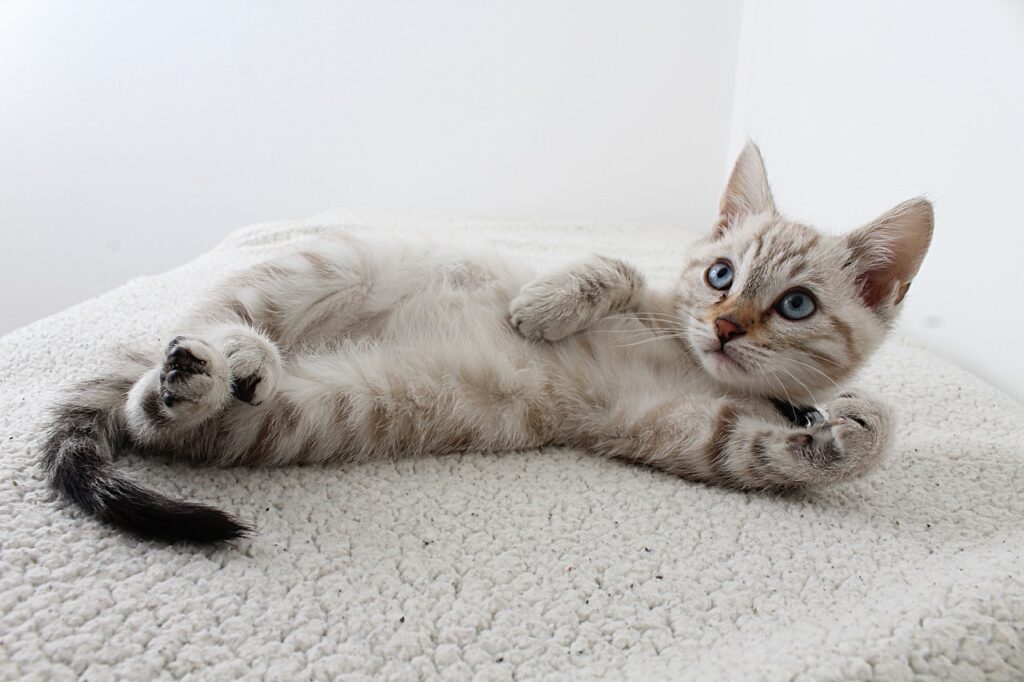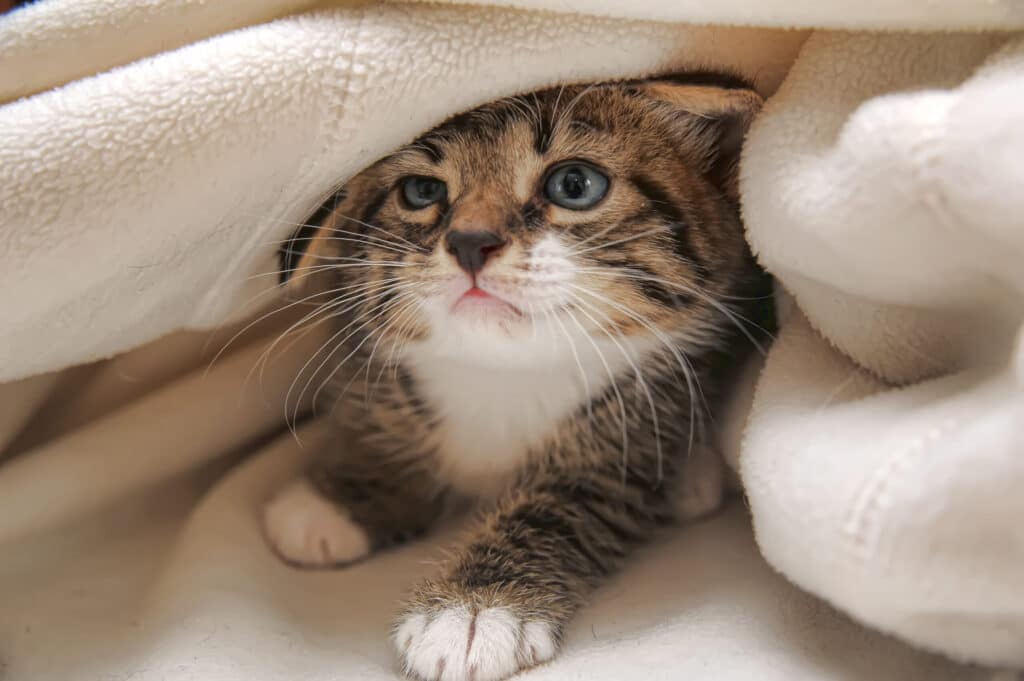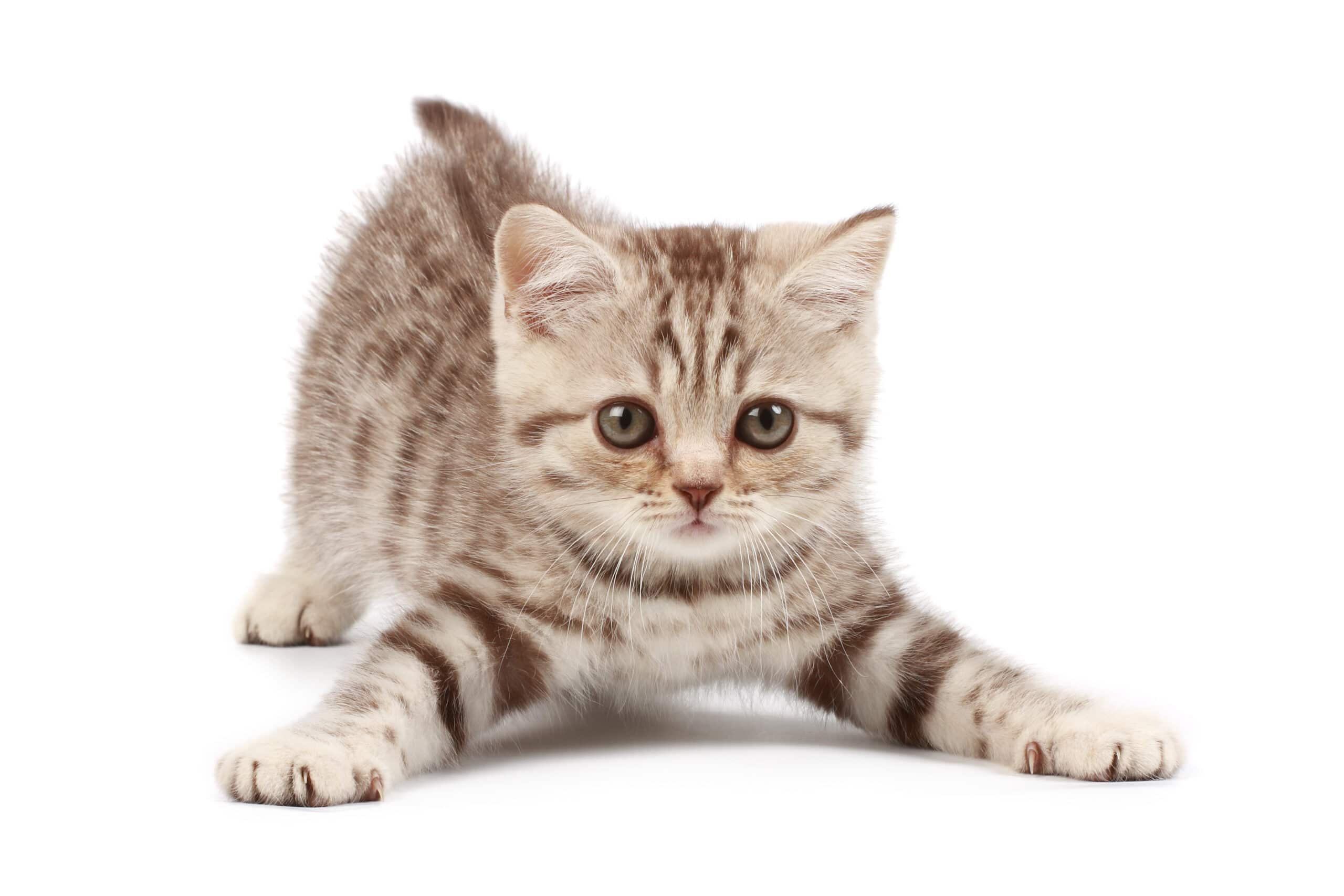Why is my kitten so hyper? 11 tips to calm your pet
Kittens are adorable with their soft fur, little whiskers, and large eyes. Almost everyone loves a kitten.
However, these adorable little ones can also be a handful, running around the house, ambushing your ankles, going up curtains, and jumping on the couch. You may ask yourself, “Why is my kitten so hyper?”
There’s a reason for your kitten’s hyper behavior; read on to find out how you can calm your kitten when she’s all charged up and tearing down your house.
The hyper behavior of jumping, chasing, and playful attacks are just your kitten practicing to become an adult.
You may notice your kitten shifting between being calm and playful; one minute, they will be cuddling with you and, in the next minute, chewing your hands.
Below are some of the reasons for hyperactivity in your kitten and it should help answer your question, “Why is my kitten so hyper?”
1. Instinct
Cats are a predator species, and kittens will continue to express their natural instinct to stalk, attack, jump, chase, bite and seek out new areas in your home.
As a cat parent, you have a responsibility to channel your kitten’s energy and instinct in the right direction, and the best way to do this is by offering plenty of playtime.
2. Boredom

If your kitten is hyper often, it may be because he is bored.
Ensure that your kitten has a variety of toys and adequate play to keep him physically and mentally active.
Provide toys that will allow interaction and keep rotating the toys to keep your kitten interested.
You can provide toy mice, ping pong balls, feather toys, balls with bells inside.
You should try to provide at least 30 minutes of play in a day, and it’s best to split playtime into 5-minute sessions spread through the day.
3. Fear
Sometimes fear and anxiety can make a kitten hyper. However, hyperactivity due to fear is usually temporary.
Meeting a dog for the first time, hearing a loud noise, etc., can cause the kitten to be hyper. However, he should calm down once he finds a place to hide and feels safe again.
Make sure to gradually introduce your kitten to new experiences; you need to be patient and allow the kitten time to get used to unfamiliar sights and sounds.
4.Too much stimulation
Petting can overstimulate your kitten and lead to hyper behavior.
If you notice your kitten suddenly acting weird (running around, biting and scratching, etc.) during petting, the reason could be overstimulation.
The area around the base of the kitten’s tail is very sensitive due to the presence of nerve endings, and you should avoid petting this area as it can lead to overstimulation.
5.Too much pent up energy

Kittens typically sleep a lot to preserve their energy. Once awake, they have a lot of energy to spend; this can also be a reason for the hyper behavior.
However, as the kitten becomes older, it will continue to sleep. You will notice that they are not as energetic as when they were smaller. So you can rest assured that your kitten will outgrow the hyper phase.
6. A case of the Zoomies
You may notice that your kitten becomes hyperactive without any external stimulation.
If your kitten suddenly starts running all around, jumping on furniture, and pouncing, it may be a case of the zoomies.
Kittens living in small spaces or left alone a lot tend to experience the zoomies more.
It is also seen right after the use of the litter box.
You don’t need to worry about zoomies as long as your kitten is acting crazy in a safe surrounding where he cannot injure himself.
The best way to prevent the zoomies is by having play sessions with your kitten to help her burn off the stored up energy.
You can have short play sessions throughout the day to keep the kitten occupied and release stored up energy.
Below are some tips for managing hyperactivity in your kitten:
1. Calm your kitten down with play
Kittens have an instinct to hunt, but they don’t need these instincts to survive in the home environment. Hence, you need to help them direct the energy into something productive, and that’s the role of play.
When your kitten engages in play, she is acting out her hunting instincts: stalking, chasing, pouncing, and finally capturing her victim.
When playing with your kitten, be careful to ensure that they don’t consider your body (fingers, hands, or feet) as a toy. Allow them to bite toys but not your fingers.
You don’t want them to learn the wrong behavior, which they can carry into adulthood.
Please don’t encourage biting; it may seem cute and harmless when they are small, but an adult cat’s bite can be painful.
2. Correct wrong behavior
You also have the responsibility of gently correcting wrong behavior in your kitten.
If the kitten bites, scratches or goes for your ankle, you need to fix the behavior calmly.
Once your kitten does something wrong, you need to say ‘No’ calmly and put the kitten in a room alone for 5 to 10 minutes.
Just make sure to do it as soon as the kitten shows bad behavior; otherwise, the kitten can get confused.
3. Provide the experience of hunting
Use a toy such as a mouse or bird to create the experience of stalking, pouncing, and capturing, which are natural tendencies in the kitten.
4. Help your kitten to calm down
There might be occasions when your kitten may want to continue playing, but you may want to stop the session.
It would help if you structured the playtime in the same way as working out in a gym.
You should get the kitten to warm up slowly and gradually go into a session of intense play, and as you near the end of playtime, you should reduce the pace and help the kitten to cool down.
In the cooling down phase, you can drag the toy at a slower pace and let your kitten pounce and catch it one last time.
If you suddenly stop play without cooling down, your kitten will not understand that playtime is over, and she will go for the target that is still moving, which is you.
5. Time out
Sometimes when your kitten is acting hyper, the best thing to do would be to put her in a safe place of her own.
A room that is not well lit will allow her to calm down.
Ensure that the room has everything she needs, including food, water, toys, and a litter box to help the kitten learn to play by herself.
If you wish, you can play some instrumental music in the room to allow the kitten to quiet down.
6. Provide trees and scratching posts

Cats like to have an aerial view, so providing a cat tree and access to a window can keep your kitten busy and engaged.
You can also offer scratching posts to help the kitten release her energy without causing havoc in the house.
7. Consider a companion
You can also consider adopting a second kitten so that the two kittens can play and enjoy companionship.
They will keep each other entertained even when you are out at work.
While playing together, the kittens will pick up social skills.
8. Give her enough attention
Make sure to give your kitten plenty of attention by making play a daily event.
Continue to interact with the kitten even if you are working at home or watching television.
Giving her affection, allowing her to sit with you, and petting her will help control problems that arise out of boredom, loneliness, and being neglected.
9. Play music
Playing soothing instrumental music is also known to help calm a kitten down. Check out this 8 hour playlist for cats and kittens.
10. Puzzles
Your kitten needs mental stimulation as well.
You can hide food that your kitten likes in different places and make the kitten work to find it.
Alternatively, you can place treats inside puzzle toys to help the kitten learn how to get the treat from the toy.
11. Consult your vet
Sometimes underlying health issues can cause hyperactive behavior.
Talk to your veterinarian to rule out problems such as hyperthyroidism.
Conclusion
We hope the insights and tips shared have helped to answer your question, “Why is my kitten so hyper?”
The important thing to remember is that hyperactivity is part of a kitten growing up and it will eventually come out of the phase.
Consistent playtime is key to managing hyper behavior as it provides an outlet for the kitten to release stored-up energy.






